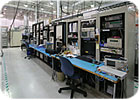
Ask suppliers about their abilities to help simplify and manage test equipment services and improve audit compliance. Source: Restor Metrology
The global demand for superior-quality products and services has companies increasing their focuses on core competencies. There is pressure to reduce cycle times and costs and improve quality. The outsourcing of noncore business functions that do not directly contribute to product design, development, production and delivery is an effective solution. Calibration of test and measurement equipment is one of these routinely outsourced functions. Proper calibration plays a critical role in product quality and improved compliance and ultimately a company’s reputation and success.
Objective evaluation of calibration suppliers is very important, but it can be tricky. The calibration industry is not regulated and there is no legal definition as to what constitutes a valid calibration. As a quality professional, it is your job to select and qualify your suppliers.
To do this, a thorough understanding and analysis of one’s needs is required to maximize quality and minimize the risk of making uninformed decisions.
Consider the following criteria when establishing a selection process:
It is a wise choice to consider accredited suppliers, yet it is not a guarantee of service quality. Like any industry, not all suppliers are equal in the quality of services delivered. Diligence on a manufacturer’s part is critical in identifying and understanding the differences.
World-class calibration providers will happily provide a detailed presentation of their quality system, calibration methodologies and technical capabilities and limitations. Also know that with accredited calibration providers, there is oversight protection through their accrediting body. Periodic audits of a supplier-along with an understanding of the remedies available at those times when quality of service is called into question-are strong pillars with which to build a supplier assessment and selection process.
Ask if adjustments are performed on out-of-tolerance during the calibration event and if that is included in the calibration cost.
If a calibration supplier performs his service on-site but must take his equipment back to his lab and charge extra to properly calibrate the equipment that may warrant further review. It certainly would affect turnaround time and cost.
As a quality professional, you have specific responsibilities to both your company and your customers to continually seek ways to reduce costs, ensure quality and improve product reliability. An informed decision-making process in the selection of calibration service providers will go a long way towards meeting those goals.